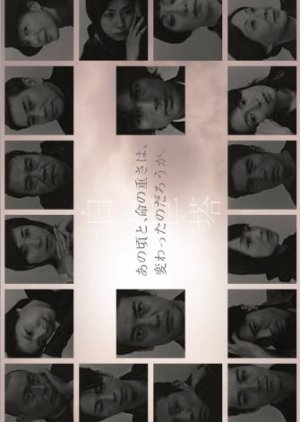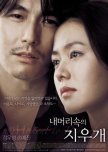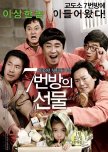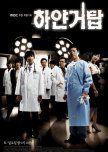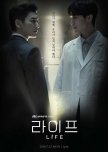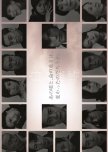
First, let me discuss its novel history. This novel was created in 1965 and has been adapted many times. The writer was "Yamasaki Toyoko". The one who created 'The Grand Tribe' and 'Fumo Chitai'. Her signature works or let's say.. Her theme was more of 'Power Struggle'. I noticed that because I've watched some of her works. It's obviously that this genre is not open or friendly seen to viewers, maybe? Perhaps, because her works were written in a depth-collision contents. Or maybe.. too harsh to be true? I hope I conveyed my point of view correctly because my grammar is not that good. :/
Okay, let's proceed..
Shiroi Kyoto is a glorious, addictive, brilliant drama though it's an underrated and very rarely seen with some viewers.. Oopps. Probably, because there's no teens idol. How sad. :(
This is not actually an episodic 100% medical drama that you'll often see doctor here and everywhere giving medical term and operations. The Hospital is just a setting here. Yes, there's so many dramas about power struggle but this one is a 'great exceptional'.
It portrays and highlights the controversy of conflicts, moral issues, ethics, power and humanity. Let alone the drama engage and allows you to peek into a world of rotten politics where you can see some nobles struggling to achieve their goal. And one of them is Goro Zaizen and the other, Satomi Shuji. The contrasting points between them made it feels like they can be hardly friends or whatsoever and yet, they respect each other capabilities even no words are spoken. Well, action is louder than words, ne? :D
Like this for example:
---- REALIST VS. IDEALIST ----
---- EMPIRICAL VS. PHILOSOPHICAL ---
My gratitude and applause to the writer for some of its great metaphorical context, very sophisticated concept and well-written script. This will remain a classic one and your timeless ambitious character-who-goes-higher-and-higher-up 'Goro Zaizen'. And... the very unorthodox charm and metaphor title that is --
"THE GREAT WHITE TOWER"
Oh how divine you are!! *music plays, "Amazing Grace"* (^o^)
About the OST, you may feel that it plays repetitive but its melody were actually referring to the one who's "The Great White Tower". Sounds heavy, huh? Characters are well-developed, it also views their motivation towards in their careers though I find some of them unrealistic but not 100% actually, so you can easily ignore it. :DD
The depressing, distress and stresses you'll feel in this drama may let you have an admiration and memorable one, that for every consequences of life, there will be a paved with indifference no matter how you look at it. This is a highly recommended especially for us who are entering the society one day. It will helps you realize that despite how messed up the world is, some around the corner.. you'll know how important the relationship between people-to-people. ^____^
Was this review helpful to you?

Before I start I’d like to say that I have always wanted to watch this drama ever since I heard all rave about it since I first started watching Asian dramas. Only, at that time I couldn’t find a way to watch it because back then Internet wasn’t as accessible as now and Asian dramas (especially J dramas) aren’t easily found streaming or even subbed. However, since I’ve decided to practice my Korean language through watching J dramas my first target would be those dramas which I’ve always longed to binge watch but couldn’t. Lucky for me a very good quality of this drama is available with Korean subs (and after long search I found Eng subs as well). The only reason I would be crazy enough to go for a medical, dialogue-rich drama such as White Tower in Korean subs is simply because I really wanted to watch it. “White Tower" was broadcasted in Japan in 2003, and in 2004, it won Japan TV Drama Academy Award for Best Picture, Best Director, and Casting Award. Because of its solid background, so I had a lot of expectations before even starting it and it has exceeded them.
The 'White Tower' is not a show of humanity, love, romance, etc., which is seen as a background for most of the medical dramas out there. White Tower is the desire of the humans to want to go higher. It shows humans constantly calculating in their minds and how they construct their behaviors in order to accomplish what they want. To put it simply it's not a medical drama, it's a story of various colors of humans. White grand tower: A white university general hospital, expressing its power and political color in its interior. Hence, is not a medical drama but a political drama.
Story:
Human desire for power and honor, battlefield of ambition surrounding the medical field. Based on the very popular Yamazaki Toyoko's novel "White Tower" this drama is a political story of doctors in a closed, bureaucratic university hospital. Yamazaki’s novel draws on the Osaka University School of Medicine as a model to draw attention to medical malpractices, the feudal system of medicine, and the struggle for power by doctors and so does the drama. For the sake of power, there is a dramatic struggle in the hospital centering on, Zaizen Goro, who seeks to hold all the power in his hand, and Satomi Shuji, who is seriously walking the doctor's path and is firmly idealistic in everything. The White Tower centers on the heroes who are on a constant path of choice, forcing extreme choices out of them. The main characters face conflict in the goal of the choice but they do not hesitate. The voice of a person who chooses power and honor sounds the same as his claim to keep his integrity and conscience. So the story goes around the hospital corridor like a tight knot that is never resolved. In the power struggle over the medical world, good and evil are only echoes for each other. The hospital is also a majestic tower in white clothing, but at the same time it is a dreary pit hidden behind a dark shade.
One of the good things about watching White Tower is the power of the story that comes from the power of human relationships. One evidential scene is when Zaizen Goro tells his father in-law “the problem isn’t the skill or talents it’s human relationships!!” And his father in-law laughs and says, “Of course it’s not the skills, if skills were enough the world would not be a battlefield would it?. It would be much easier world to live in if that was the case but it’s not” (You’d have to forgive me if that is not as accurate as it should be because this is what I understood from the scene which is interpreted through Korean subtitles).
The Great White Tower is divided into two, half of which is a cross-section of the organizational society in which various political patriots are involved in the election of the chief of the surgery, and the other half is the doctor, the hospital and the patient's legal confrontation surrounding the medical accident. There are various doctors in the white tower. A doctor who is ambition-seeking, a humanist doctor, and a researcher. So what is a doctor? What does a doctor do? The easiest way to understand a doctor is to concentrate on what "doctors do". In The Great White Tower however, the story is searching and revealing out characteristics of real doctors in our society and dealing with their dreams and ambitions. To put it in simple words this drama is basically aimed at presenting the theme of "what is a doctor" through the confrontation between Zaizen Goro and Satomi Shuji.
It is also a good insight on how the hierarchy system works in the medical world in Japan, for instance the professor becomes a professor through assistant professors. The professor holds only one person in his / her department, and takes over all the power of the position until he retires.
Acting and Characters (This is a long section because there are just too many characters worth mentioning but I tried to minimize the list with 4 only):
Karasawa Toshiaki as Zaizen Goro is a genius that specializes in esophageal surgery and is the best in esophageal surgery. Has a desire for success and a strong ambition, he chases after his honor and reputation rather than his patients. The performances of Karasawa Toshiaki made it possible for me to know what he was thinking and what is he going to do without having to read the subtitles. He gave out such a GRAND performance how else could someone even love Zaizen’s ruthless arrogance if it wasn’t for Toshiaki’s realistic admirable performance, which does leave you vulnerable and can’t help but root for him. I will never forget Zaizen’a humming song and the way he moves his hands picturing the surgery in his head making his hands dance along as he operates inside his mind, something very profound that I’ve never seen before.
Eguchi Yosuke as Satomi Shuji has no ambition and no greed as a doctor, and therefore has little relationship with his career. He is a person who only cares about patients without being interested in becoming a professor. I read that there was some criticism thrown at Satomi’s character that he was a non-flexible idealist, and someone like him does not exist in the world, but I personally think that such a person might exist in the world. He is a person who can carry out his thoughts without leaving them to be compromised by external pressure. In other words he is the 'hope' that you may think it does not exist but at least it should not be forgotten. Not many people will understand Satomi, but you cannot help but appreciate him. I really liked Eguchi Yosuke’s portrayal of Satomi, it is quite impossible to separate the actor from the character now.
Ishizaka Koji as Azuma Teizo a person who cannot abandon his status as a member of a doctor 's family and is caught up in authority rituals. He is ahead of his retirement, and he gets caught up in jealousy and inferiority towards Zaizen Goro. Ishizaka Koji’s performance was solid I could feel Azuma’s anxiously and fear so easily due to his spectacular performance.
Hitomi Kuroki as Keiko Hanamori her relationship with Zaizen Goro is noteworthy, it can’t be seen as a simple affair. Keiko dropped out of medical school and ran luxury bar. She is the only one Zaizen opens up to and she is kind of supportive alley to him in this battlefield. The bar she operates is ran by the people in the hospital, so sometimes it comes in handy for Zaizen Goro. I love her witty brutal honest responses and discussions with Zaizan. I loved loved LOVED Hitomi Kuroki’s Keiko her facial expressions, her voice and her laughs everything was just so delicious and witty and fun to watch!! She was such a wonderful spark to the show.
I personally loved the relationship between Zaizen Goro and Satomi and all their electrifying and unforgettable scenes filled with conflicted dialogues, which were, breathtaking and deliciously witty. They are friends since college but they are very different. Their relationship is founded on acknowledging and respecting each other while establishing an angle of confrontation. It is interesting to have a relationship between two people who have different values but seek the same goal, which is saving patients and changing the system. In some ways, Zaizen tries to make changes from above, and Satomi tries to make a change from the bottom up. In the end, both of them wanted the development of the hospital and the development of medical care. However, their methods were different.
Overall
The drama was thought to be serious and heavy, but to my surprise it was lighter than expected. It was a heavy and difficult topic to deal with, but the drama did not lose itself in the midst of the heavy content. As I was watching this drama my thoughts were shivering and possibly this is the most time they were provoked. It is really a thought-provoking drama that will hold on to you and never leaves you until you are done watching the whole thing. I could not take my eyes of the drama. Something is meaningful and profound from the title of white tower. A tower that is built to earn honor in a society through a university hospital but instead was destroyed and ruined by the absence of ethics and conscious. One of the best dramas, which will always remain memorable to me, definitely worth every praise and award. I could not possibly explain with mere words how much the ending touched me so deeply, I will only say that it’s rightfully one of the poetic thought stimulating ending I have ever seen and has managed to make me shed some tears. I don’t know if I will ever be able to let down my guard and watch the K version.
Was this review helpful to you?

- That's because desire is the purest emotion there is"
For the whole time I was watching this drama, I couldn't stop thinking about how universal and timeless this story is and how it can be re-done over and over again without losing its meaning. That shows how insightful and well-thought-out the source material is. Desire and greed is a permanent part of human condition and we can make the best, as well as the worst, out of it. As we can see in The Great White Tower by the example of Zaizen's aspiration and Satomi's humanism. When you combine it with a multilayered plot about complex politics, interesting and unconventional characters and a solid dose of sublime symbolism, you'll got a memorable drama at least, a masterpiece at best.
The drama is divided into two arcs. First arc is about internal power struggle among the doctors of University Hospital and Zaizen's fight for professorship. It was clear to me that the hospital setting is very conventional, very symbolic, as it was more about what was happening and not where it happened. The meticulous political machinations exposed the true nature of doctors, seemingly the most rightheous and trustworthy class of people, as greedy, corrupted, selfish and egoistic.
With Goro Zaizen as the most self-righteous and cynical of them all. But I have to admit that up until his pettiness allowed him to make a grave mistake, I didn't really see any wrongdoings on his side. Yes, he was overly ambitious to the point of being totally selfish and merciless (and I wanted to punch him in the face for that), but he was true to himself and just played the game the rest of the world was playing. His surgical skills were masterful and he saved a lot of people, so why not use it for your own gain like money, fame, power? After all, what's wrong with having an ambition?
There is no limit to human greed... or is it? Which is the topic of the second arc of this drama. The lawsuit and the court case. This part is more introspective and focused on each character, as they all had to make a hard, and often life changing, decisions. If the first part of the show comes off as a little too raw, heavy and cynical at times, the second part is more humane and thought provoking. It criticizes hierarchal structure of society with the corrupt "top" (or a White Tower) seen here as the medical team of University Hospital. It's also more clichéd with the karmic ending, but I didn't really mind that because it fits the overall story. And my taste in this case (I'd prefer more brutally honest, borderline nihilistic ending) would propably cost this drama a lot of criticism lol.
Apart from exciting plot the other strong aspect of this show lays in well-written characters. I like how Zaizen and Satomi were shown as the polar opposites. One seemingly negates the other, but to me they were so alike. Both ambitious, with similar principles, but driven by the different desire. While one wants to be acknowledged for his craft as the greatest surgeon, the other wants to push further the research for the greater good, not for the fame. While Zaizen seeks power, Satomi seeks hope. While one cares about the result, the other focuses on treatment. But in the end, despie the constant disagreements, they were always full of respect for each other and their unusual friendship lasted till the end.
I also appreciated the recognizable secondary characters, such as Zaizen's father in law, Professor Ugai or - my absolute favorite - Professor Okouichi. And small character developments of Professor Azuma or his daughter, Saeko, were also nice. It's the other female characters that I had a problem with. Zaizen's wife and his lover, Keiko (the actress was fantastic tho). They contributed nothing to the story and failed the Bechdel Test, as they were nothing more than Zaizen's orbiters. I feel like they, especially Keiko, existed only to elevate Zaizen's position as this uber alpha male, which is... sexist.
Although I absolutely loved the symbolic nature of some scenes and the overall pathos this drama oozes with, I cannot for the love of me understand the Auschwitz scene. I feel like that's the second thing that didn't bring anything meaningful to the plot. I think the show tried to be too philosphical with this.
Overall, this drama hit all the right spots for me. It has complex politics, great writing, unconventional main character, fantastic acting, memorable ost and the enormous quantity of sublimity, so if you're into epic and thought provoking stories, then this is a show for you.
Was this review helpful to you?

I recognize your skills but not your views.
This line said by Dr. Satomi to Dr. Zaizen perfectly sums the relationship between the two protagonists of The Great White Tower and (imo) make the show the masterpiece it is considered to be.While Shiroi Kyoto or The Great White Tower is often applauded for its portrayal of human desire/greed, ambitions, morals, ethics and ideals, it is the relation between the two polar opposites protagonists which makes this drama worth watching in my eyes.
It is tough to explain the what's between Zaizen and Satomi to anyone who has not watched the drama. It is not friendship or any sort of companionship. It is a sort of camaraderie between two people who respect each other and their talent even if their ideals and morals clash. Throughout the show, both are always in conflict with each other but still you can feel how much they actually value the presence of the other in their lives and watching them together was the best.
Talking about the writing, believe me when I say that it was perfect. Often shows like these can turn into cliche with an overly ambitious lead who only cares about power coupled with another lead who is the most morally upright individual who desires nothing but only the greater good. But as brilliant the plot is, this was not the case here. I never felt that I had to choose a side or assign the role of villains to any character. Everything was so thought provoking that you can't help but root for the characters and at the same time question their actions and decisions. The intricacy of the plot leaves so much on your own interpretation and values, which I honestly think is something not easily achieved by dramas.
Another instance of the brilliant writing is the suspense throughout the show. In both the arcs I sat with bated breath as to see what the outcome will be. Judging by the common drama formula, of course I predicted some obvious events but the whole process to reach the goals was very much engaging and interesting and kept my attention the whole time.
Both the internal power struggle and the external court case complimented each other really well and along with the equally well written characters make The Great White Tower actually great.
Now the drama is actually a 10/10 in my heart. But the 9.5 here is because of two issues I had. Firstly as I said above, I never considered Zaizen a character with negative traits. Ambitious he was but he still was a skillful doctor who wanted recognition in medical field both for himself and his patients. I actually wanted him to reach the top. So the course of events leading to the lawsuit seemed too much to me. It was almost like he didn't cared about the mistake on his part and it's future consequences on everyone around him. I get the issues which led Zaizen to behave that way but to me it felt a bit out of his character or maybe I read him the wrong way.
Second thing is Professor Azuma's dislike towards Zaizen. Honestly I never understood why he was so much against him apart from the whole 'Zaizen is not idealistic and only has skills thus he can't go far' issue and that he outshined him despite being his student. I know that it is realistic and this happens but since it formed the basis of the whole drama, I just can't seem to get it out of my mind and would have loved it if Professor Azuma's character was explained a bit more.
Apart from all this, a perfect show with great writing and amazing acting which was a delight to watch. The OST seemed a bit strange at first but I appreciated it more as the show progressed. Especially that little opening sequence with the white tower and the bgm always hyped me up and put me right into the mood.
I'll definitely rewatch it sometime in the future and hopefully I'll appreciate it the same or even more.
Was this review helpful to you?

An Extraordinary, Timeless Masterpiece
Magnificent story complemented by Karawasa's top class acting. I knew that this is going to be one hell of a run at 21 episodes (with episode 11 lasting 1.5 hrs), and being a big fan of Yamazaki Toyoko sensei, it really was worth giving time to enjoy this. Yamazaki sensei was renowned for her excellence in portraying power struggles, tragedy of war and moral issues, hence this dorama (novel) was definitely made to be different from typical medical themed works. So, don't expect to see happy things much in this dorama and her other works.I've watched other adaptations of her other best-selling novels - Karei naru Ichizoku(2007) and Fumo Chitai (2009) which are also glamorous projects, but this "Shiroi Kyoto" sits atop of those two. I will just focus on the theme and elements of the story.
Desire, ambition, hierarchy, power, prestige, justice, ethics, morality, empathy, loyalty, betrayal, losing face, etc.,
all those emotions and objects that we humans thrive for and struggle to draw the lines from time to time, are all portrayed superbly fitting in every character and scenario. I would even say that Shiroi Kyoto should be shown in classrooms as a case study for Maslow's hierarchy of needs - that's how great this dorama is!
On acting, at some points, certain acts could be seen over the top (in particular, the wives in the Rose club), but given how the story and characters were designed, it was just fit (for Japanese society, probably it's the same in many other Asian cultures).
I've watched many of Karasawa Toshiaki's works, from comedic "The Last Cop" to "Fumo Chitai" (another adaptation of Yamazaki Toyoko) and IMO, this is his masterpiece. Eguchi Yosuke as Dr. Satomi is also a right fit as an idealistic character whose existence may be hard to find in real world. While the main characters are at the extreme opposite ends of personality and values, characters like Prof. Azuma (Ishizaka Koji) and Dr. Yanagihara (Ito Hideaki) lies somewhat between that spectrum, and complement the story. Also the supporting actors did the perfect jobs to their characters.
Ending theme "Amazing Grace" serves as reflection of the lives of Dr. Zaizen and Dr. Satomi. I also feel that the song is telling Dr. Zaizen to be "Magnanimous in victory, gracious in defeat". OST was composed by Kako Takashi, a renowned Jazz pianist and composer. The tunes were really synced to the characters and scenes.
Rewatch value? Obviously very high.
I would say you don't even need to rewatch to remember, the story and characters will always stick to our memory if you really enjoy. But I think "Shiroi Kyoto" should really be rewatched once with your beloved ones in case if your first watch was alone. Let your beloved ones also enjoy the magnificence of the story, characters and actors as most of the screen entertainment these days cannot offer what "Shiroi Kyoto" can.
Was this review helpful to you?

Grande Masterpiece
I've never come across such a drama that blew my mind completely.The great white tower is such a high-class socio-political drama.
You can divide this drama into 3 parts :
1. Power Struggle
2. Ego accompanied by forced melodrama
3. Life
This drama is a perfect example of Dilbert's principle, which in simple terms states that a talented person will hardly find a position at the top.
Part 1 is exceptional in every way, all the matters shown in that regard are so progressive and real that you can't help but clap and be impressed with it.
It deals with how climbing with the top isn't easy. How little control you've over everything.
Politics is present everywhere.
People are jealous of those who are talented.
Part 2 is forced and often turned to a melodrama by showcasing that the sense of justice is relentless.
I didn't like part 2 as it was cynic, the writer was evident in showing that no matter what wrong might've been caused, karma always bites back.
This is not right, coz what the writer showed in the 1st part was so great that the 2nd part just fell off the cliff.
Part 3 is self-realization bout life, as a person and as a doctor perhaps but more important than that as a human being Life is important, you never know when you'll die.
So learn to express and take care of those who are near you. ^^
Overall it fits a perfect 9, the reason being when you're focusing on such a high-class politics why involved a social message with melodrama in the 2nd half, as a person who loves to watch the clever theme, this ruined the theme for me.
It could've been introduced in a much better way.
PS: Special mentions to the acting and the soundtrack.
One of the greatest and legendary casting in any J drama you'll ever come across. The acting standards of this drama are so high, that none can come near this.
The soundtrack was so classy and melodious to hear.
At each and every moment I could feel the intensity of this drama.
I can bet, the standard of J dramas have gone down nowadays.
Who even a drama from 2003 represented the true potential of how exceptional J drama were at the time .
Was this review helpful to you?

This review may contain spoilers
Underwhelming.
A political drama in disguise, The Great White Tower explores the machinations and dealings of the inner circles of Japanese medical universities. But on the other hand just like any typical medical drama, it also explores the moral dilemma of doctors, specifically when their personal interest clashes with the needs of patients. In retrospect, It is certainly not a terrible drama, however I think that it is also undeserving of its score and acclaim.The plots tells of the protagonist, Zaizen, and his ascension to professorship in a famous medical university, and his ultimate downfall. The drama connects Zaizen's rise to power to a larger plotline concerning the exorbitant usage of bribery and blatant corruption. It is a typical depiction of "absolute power corrupts absolutely" and is probably an allegory for the large amount of corruption that exists in the modern Japanese medical society. It criticizes a system that only enables those with money and/or connections to advance in a society. It paints Zaizen as an ambitious villain who only cares about himself and puts up a facade around others while the other protagonist, Satomi, as a worthy doctor who cares about his patients and is willing to give up personal benefit for the sake of others. This type of blatant vilification to the audience is the primary issue I have with this drama, and in general, most other dramas.
In the drama, Zaizen and Satomi are depicted as polar opposites of each other. Zaizen is portrayed as a pragmatic, utilitarian man who only cares about his person agenda, while Satomi is portrayed as a selfless caring man who is willing to give up personal benefits for the sake of others. To audience, Satomi, as a morally correct character, is much easier to relate to than Zaizen, even though in reality, the two characters are fundamentally the same, as they are both principled men who are driven by their personal desires (and yes I do believe that altruism, at the end of the day, is just a different form of personal fulfillment). To the audience, Satomi is a better doctor, because of his character traits, than Zaizen is, even though Zaizen possesses incredible surgical skills and is more than qualified himself. In the early episodes regarding the female character who later died of cancer, Satomi tries everything he can to prolong her life while Zaizen just dismisses her as a lost cause, and he makes the argument that it is better to focus his attention on others instead. This is the classic trolley dilemma, and there is no right answer to this. But because Zaizen is painted as the "villain" in the series, to the audience, his inhumane viewpoint must be incorrect and Satomi's viewpoint on the other hand, is the correct approach. This type of railroading to the audience is something I've grown to hate, and it is annoying to see it throughout this entire series.
Moving on to the music. I must tell you that I was so tired of hearing Amazing Grace by the end of this show. The over usage of this just makes me sick. Incredibly unimaginative.
Some other nitpicks include the dialogue in the one supposedly "deep" episode with Zaizen visiting Auschwitz. I mean, seriously? It's almost as the Japanese army never committed any atrocities of their own during WW2.
Overall not a terrible drama. You get what you expected with the rise and fall of an ambitious character. But I don't believe at all that it is as good as others make it to be.
Was this review helpful to you?

